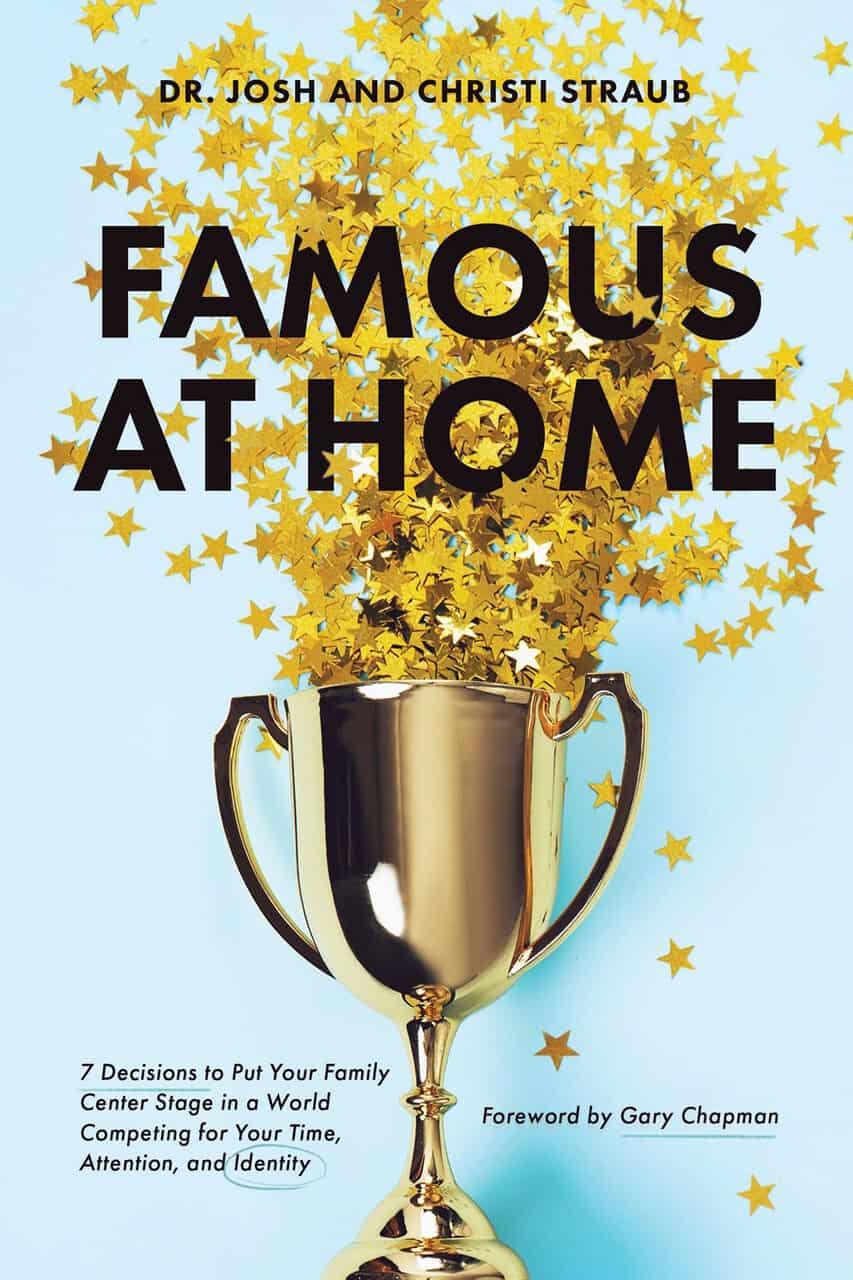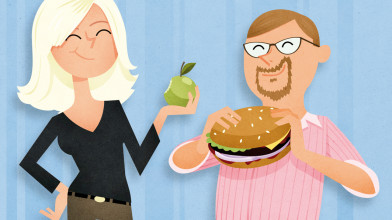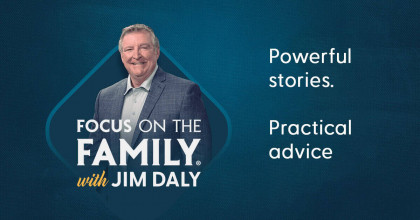Man #1: One thing I’ve done right with my kids is giving them the benefit of the doubt when things go wrong.
Woman #1: One thing I did right with my kids was instilling the value of family.
Man #2: We had one rule in our house that was really important, it’s okay to make mistakes.
John Fuller: Well, how about you? What parenting strategies and tools have you found to be really effective with your kids? Today, on Focus on the Family with Jim Daly, we’ll examine some better ways to raise happy, healthy children and help you be a better mom and dad. Thanks for joining us. I’m John Fuller.
Jim Daly: I’m thinking, take a bath mister and do it now (laughing). Not the best approach. But, uh, for some reason, I’m thinking, yeah, that was one of our boys’ big challenge.
John: That was a battleground, yeah.
Jim: Like, “Baths are useless, dad. Why should we do that?”
John: Hmm.
Jim: He was very young. He now bathes every day, I am happy to say.
John: Oh, I’m glad to hear that.
Jim: Which is, kind of, the point. It works out in the long run.
John: Mm-hmm.
Jim: They’ll be some motivation. Maybe it’s girls that end up motivating them (laughing) to get clean. But, uh, today, we do wanna celebrate parents. And moms and dads play such a critical role in the growth and development of their children. And, uh, it’s number one, actually, even surveys today, when you look at it. We think friends or, you know, peer groups or outside groups are gonna be more influenced. No, even the teens say, “My mom and dad have the most influence in my life.” So, take heart. We still have a place in our kids’ hearts. Uh, good parenting takes a lot of effort and intentionality, I think you know that, if you’re trying to do it with thoughtfulness. And if you need help, we’re here for you.
John: Mm-hmm.
Jim: Today, we’re gonna cover, uh, some great content about raising those little loved ones.
John: Mm-hmm. Yeah. Josh and Christi Straub are with us today. Uh, they’re authors and speakers. They, uh, do marriage and leadership coaching and host a weekly podcast called Famous at Home. They also have a book with the same title. And a lot of the content that we’ll explore today comes from their podcast episodes, which I know you’re gonna find helpful. You can learn more about the Straubs, their, uh, ministry, and the many resources we have for you here at Focus on the Family. Uh, the details are at focusonthefamily.com/broadcast.
Jim: Josh and Christi, welcome back. You are fan favorites, I hope you know, here at Focus.
Christi Straub: Aw.
Dr. Josh Straub: Oh, well, we are honored to be back.
Jim: Yeah, the last…
Christi: It feels like family.
Jim: Oh, that’s good.
Christi: We love it.
Jim: Yeah. The listeners, the YouTube watchers, they love when you’re on because you, you do, you deliver great wisdom on the parenting journey. And you guys are not only, uh, you know, teachers of it, you’re in it as well.
Josh: Yeah.
Christi: (laughs)
Jim: And I love that aspect of it. Your oldest is 13 now and your youngest is-
Christi: Five.
Josh: Five (laughing).
Jim: I’m sorry. Should I laugh at that (laughing)?
Josh: Great. It’s okay. All, all good.
Jim: So, you guys are living the dream.
Josh: It’s great.
Christi: We’re living it.
Jim: Which is good. I… you know, we said this, but, um, somebody gave me great advice. Just love every stage of-
Christi: Yeah, yeah.
Jim: … of parenting. And think that’s been good.
Christi: Yeah.
Jim: Find the joy in it. Yes, even with the teenagers.
Christi: Yeah.
Jim: And there, it’s like just getting connected, right?
Christi: Yeah.
Jim: Just trying to figure out how to stay connected to your teen. And you’ve done a good job in the early years. That will happen pretty easily.
Josh: Yeah. And I, I couldn’t love this stage more at this point. I think, yeah, like, I’m, I’m loving the relationship that I have with our oldest. Um, yeah. It’s fun because he wants to… he’s like a sponge. He wants to soak up everything that-
Jim: Oh, yeah.
Josh: … that he can to learn. And I think it’s partly firstborn. I think it’s personality. But I just wanna be alongside him. I wanna be the one that is shepherding his heart along those journeys. And I don’t wanna ever take that for granted.
Jim: Mm-hmm.
Josh: Even though there’s tons of questions and there’s tons, you know, sometimes he’s asking questions where I’m like, “Okay, buddy.” Like (laughs), like, “It’s just gonna…”
Christi: And it’s always at, like, bedtime.
Josh: Right at bedtime.
Christi: You know when you’re done for the day?
Josh: Yes. Mm-hmm.
Christi: Like, I’m done. I’ve… I’m tucked out and it’s… that’s when all the questions come.
Josh: That is true (laughing).
Christi: And so, I’m like, “Josh, I’ll put you in, coach. I’m out. I’m outta here.” (laughing)
Jim: Yeah. I love it.
Josh: Deep, philosophical question come at bedtime.
Christi: Yeah, yeah.
Josh: You know, it’s like…
Jim: Yeah. It, kind of, kind of, gets… turns us right into that first question I wanted to ask you, because although you’ve studied it, you got your doctorate in child development and you’re there learning, too, Christi is… you’re working with Josh, but that’s what I love, you guys are very open about your own struggles in the fact that I know these things, which gives me so much hope.
Christi: Mm-hmm.
Jim: ‘Cause Jean will say occasionally in her sweetness to me. You sit with experts all day long and talk to them (laughing). How come you don’t know this?
Christi: I love your wife.
Jim: She is good.
Josh: She’s great.
Jim: Yeah. She just always hits me with a two-by-four when I need it.
Christi: Yeah.
Jim: Which is perfect. But you have struggled at times. So, um, how has that progressed? And that reality of life is life. So, you’re not coming in going, “Hey, we’ve done it perfectly. Our kids are gold standards,” and that kind of thing, which again is great.
Josh: Mm-hmm.
Jim: But talk to that realism, for the parent that’s hearing us, going, “Yeah, you might do it. Well, I, I’m struggling.”
Christi: Yeah.
Josh: Mm-hmm. When I’ve studied research and I even look at scripture and I filter it through scripture, basically, what I’ve come down to is that our children become who we are. In other words, our ability to show up well in their overwhelmed moments and our ability to enter into their world and come alongside them and be safe for them is what will lead to every major outcome that we desire in our children. And I think that, if I can be a dad who, even when I get it wrong, I sit with them and I say, “I’m sorry.”
Jim: Yeah, that’s so true.
Josh: If I can be a dad who can be interested in what they’re interested in, even if I don’t understand it-
Christi: Mm-hmm.
Josh: … or even like it, but to go, “Teach me more about that.”
John: Yeah.
Josh: I’m entering into their world and I’m pursuing their heart. And that’s where my flaws… I have to apologize often. Um, I have to go, “Guys, you know, you have to set your boundaries,” and things like that. But I think, as long as I’m pursuing heart of my kids, even in my own overwhelm, that’s what truly is gonna ma… make the difference.
Jim: That’s, that’s a great way to say it, “As long as I’m pursuing the heart of my child.”
Josh: Mm-hmm.
Jim: Let me, let me talk about joy. That’s something you have talked about.
Christi: Mm-hmm.
Jim: Finding that joy. Now, the problem I see with the joy factor-
Christi: Yes.
Jim: … is we’re so critical-
Christi: Yes.
Jim: … of ourselves. And that spills over to our kids. And that environment, as well as our kids, are able to push those buttons in us-
Christi: Mm-hmm.
Jim: … that zap us of the joy of the journey of parenting.
Josh: Yup.
Jim: How do we recognize to pull that in a little bit?
Christi: Mm-hmm.
Jim: Don’t play the game.
Christi: Mm-hmm.
Jim: You know, don’t get overly engaged emotionally when it… you know, in the wrong direction.
Christi: Yeah.
Jim: But did you ever experience trigger words that help you to say, “Okay, I’m the mom, I’m the adult. I’m not gonna respond with, ‘What are you talking about?'”
Christi: Guys, this is, like, this is literally where I have focused pretty much everything I’m doing now, which is funny we’re talking about this right at the start. Because I get to sit with mostly women, and I will ask them one question usually. And it was, “When was the last time you experienced joy?”
Jim: Yeah.
Christi: And do you know that I’ve only ever had one woman who was able to respond to that question?
Jim: Whoa.
Christi: So, for everyone listening, if that is like, “Joy, sure, that sounds good, but when was the last time I experienced, like, I felt joy?” And I think that it’s just a weightiness to that question that, in our culture, that’s moving so fast in all of the threat, ’cause ultimately, the antithesis of joy is an experience of threat. So, if us, as parents, we’re experiencing threat in any way, so, “I’m worried how my kid’s gonna turn out. He’s there throwing a tantrum right now, I don’t…” like, it actually doesn’t feel safe to us. And so, from, like, neurobiologically, we shift into a whole different system.
Jim: Fight or flight, right?
Christi: It is.
Jim: Yeah, that’s right.
Christi: Fight, flight, freeze, fawn was that one. And then there’s one that’s actually below, it’s just total shutdown.
Jim: Mm-hmm.
Christi: So, we call it a dorsal vagal response where we go into… it’s a full e-break. And I think so many… I’m gonna speak to moms right now just ’cause that’s what I know best, but I believe dads, too. We’re living in fight or flight. And so, it’s in a state where we’re constantly scanning for threat.
Jim: Mm.
Christi: So, it’s like, “Is, is this safe? Is this not safe?” That’s basically the question the nervous system ask. And if it finds that there’s any threat, it moves us out of our… the state where we’re most ourselves, which is where we experience joy. So, meaning, like, even from a nervous system perspective, we actually can’t experience joy when we are under threat. So, to all the parents who are like, “I, I wanna experience joy in this parenting thing,” but, like, “I wanna enjoy my kids. Why aren’t I?” There’s nothing wrong with you.
Jim: Let me, let me inject this because it’s so important. I would call it the higher brain function for the adult.
Christi: Mm-hmm. Yeah. Yeah.
Jim: You know, the frontal lobe.
Christi: Yeah.
Jim: And I don’t want to reduce it to just that. The Lord’s in all of us.
Christi: Yes.
Jim: He created us.
Christi: Yes.
Jim: He created the brain-
Christi: Yeah, yeah.
Jim: … to Function. Um, but it’s, you know, those external things that try to trip us up.
Christi: Mm-hmm.
Jim: Our child’s emotional outburst, whatever it might be. We’ve gotta be able to absorb that in an adult way (laughs).
Christi: Yeah. Right.
Jim: And say, “Okay, hon. What’s happening?”
Christi: Mm-hmm.
Jim: “What’s going on?” Rather than the full-on irritation to where you’re acting like the three-year-old.
Christi: Right. But it’s… and it’s triggering you exactly that way.
Jim: But in that way, that’s the point. Like, how do we step back from being triggered on those basic emotions that we should develop-
Christi: Yeah.
Jim: … an adult response to, so we’re not in the fight-or-flight, and the other three that you mentioned?
Christi: Yeah. Can we go real practical?
Jim: Yeah.
Christi: I can, like… we can actually do one real, practically. So, I do a program called Tender and Fierce, where I get to take women through this, because I’ve realized this is what we’re missing. And it’s not so much about our relationship with our kids, though, that matters dramatically. But it’s what Josh said, “If I’m not able to handle my emotion, my emotional overwhelm that is going to… Like, the kids are just the byproduct, the fire in us comes out at them.”
Jim: Mm-hmm.
Christi: “So, we have to take care of us first.” And so, it’s getting back to those tender places in us. And there’s one concept called Microspace that I teach that is a way to… It interrupts the system because what happens is it’s just happening on a loop. Right? I get triggered, and I know the nervous system will go back to the last thing that worked. So, if the last thing was I blew up, if I yell, it stops the reaction. And it knows next time it just is gonna go back to that same reaction because-
Jim: Mm-hmm.
Christi: … it saves energy, ’cause it, it worked once. And so, all we’re doing is interrupting these common loops. And so, we actually do this thing where you literally just put your hands out. If you’re watching on YouTube, you’ll see, but if for those listening, I’m just putting my hands straight out as if you’re stopping traffic on either side, and you just say space.
Jim: Yeah.
Christi: And it, it’s a verbal cue. It’s a physical cue. And then I’m gonna do this. And I might sound funny in a mic, but I’m patting my body, so I’m just gonna like pat all the way down to my legs. And it’s putting stimuli into the body that interrupts this whole fight system.
Jim: Yeah.
Christi: That is so used to operating, and it’s telling the body at the body’s level. We start there because the spirit even follows the natural.
Jim: Yeah.
Christi: We, like, we learn that in Scripture. And so, we actually kept to calm the body in order to get the soul quieted.
Jim: Yeah.
Christi: ‘Cause we are body… We are, we are spirit with a soul that lives in a body. And I think the body part has actually been the part we’ve missed a lot.
Jim: Yes. I remember Gary Chapman was gonna be on, he wrote the Foreword for your book, Famous at Home, I saw.
Christi: Yeah.
Jim: But Gary, we were talking, and then I went home, and I was talking to my four-year-old at the time, Troy.
Christi: Hmm.
Jim: I said, “Troy…” You know, in four-year-old words, “What do you think your love language is? Do you think it’s, you know, acts of kindness?” Servant-
Christi: Yeah.
Jim: And as soon as I said, “Physical touch.” He goes, “That’s me.” At four.
Josh: Yeah.
Jim: And he goes, “That’s me. That’s me, Dad. That’s me, Dad.”
Christi: Yeah.
Jim: And I mean, it’s still to this day.
Josh: Uh, the definition of joy is, uh, being the apple of someone’s eye. That when you walk into a room, you get the experience that “Someone is glad to see me.” That, that’s what relational joy really is. And, and when you take that scripturally, we can’t translate the Hebrew as well into English into what it means. So, we, uh, you’ll a lot of times hear in the Book of Psalms, or you’ll hear throughout the Bible, “God’s presence. In His presence.” Uh, you think of the benediction, um, “May the Lord’s face shine on you, be gracious to you.”
Christi: Mm-hmm.
Josh: And everywhere that there’s, you know, God’s presence, basically what we’re finding, uh, is that that basically means God’s face. God’s face. And when you look at his face, you experience, “I’m so glad to be with you.”
Christi: Mm-hmm.
Josh: And you think about the Heavenly Father, and you think about it from that relation that the Heavenly Father is glad to be with me. It sets… I genuinely believe the biblical, healthy, biblical community is the safest, most beautiful place for us to be as parents.
Christi: Mm-hmm.
Josh: Because for us to break free of the, the, what I call the matrix, we’re living in a matrix. And it’s why we are so overwhelmed. It’s why last year’s number one book, um, was Jonathan Haidt’s book called The Anxious Generation.
Jim: Hmm.
Josh: It’s like we’re living in this space where, “What is the purpose that we’re doing all this for?” And when you pull back and you go, “Oh wait a minute, I’m loved by a God who is happy to be with me. I’m the apple of his eye.” And when we start to experience that as parents, and we find healthy community-
Christi: Mm-hmm.
Josh: Now, all of a sudden, we’re not doing this parenting thing alone.
Jim: Mm-hmm.
Josh: And now you take it to the micro moments that Christi’s referring to. And these moments are a little bit easier because you have community that you’re also doing it with. And then your four-year-olds, your twelve-year-olds, (laughing) your fourteen-year-olds are experiencing you coming home. Even your overwhelmed going, “Oh, I’m the apple of my mom’s eye.”
Jim: Yeah.
Christi: Mm-hmm.
Josh: “I’m the apple of my dad’s eye.” And we love because why he first loved us. And it just overflows out of there.
Jim: Yeah. That’s good. You know, uh, before we move off of joy and we’re gonna move to some, uh, ways to achieve that, uh, you have a fun one. You’ve gotta be intentional about this, too. Have the lava-
Josh: Trickle-down effect, man, I’m telling you.
Jim: … stories. So, you’ve gotta think about “How do I bring joy to the home?”
Josh: Yeah.
Jim: I love the lava story. Share it with us.
Josh: Yeah. Well, our five-year-old loves the Floor is Lava song (laughing). I mean, the 13 and 11-year-old do too. They’ll put “Floor is Lava on…” You know, it’s a song that if you’re a parent, I’m sure you’ve played it.
Jim: Yeah.
Josh: And you know, the kids are jumping up on the couches and things. And I realized I took life too seriously for a very long time. And I think I was caught in the matrix of, you know, achievement and all these things. And I’ll never forget I was sitting on the sidelines. Our son Micah scored a soccer goal. It was his first soccer goal he ever scored. And I have this video, he scores the goal, and he comes bolting right back to me with the biggest smile on his face as soon as he hit that goal. And again, getting outta the Matrix, it’s not even about the goal. He came running… Who did he come running to?
Christi: Mm-hmm.
Josh: His father. And he was so full of joy. And I had this moment where the Lord… It wasn’t audible, but the Lord spoke to me in that moment.
John: Mm-hmm.
Josh: And he said, “Do you see the joy on his face? Imagine how much more I experienced joy as your father-
John: Mm-hmm.
Josh: … when you’re living in joy.” And that was a moment for me where I was like, I have to be… When the Floor’s lava song comes on, I have to be the first one to jump on the kitchen table.
Jim: I love it.
Josh: ‘Cause the trickle-down effect is real, uh, epigenetically, whatever, genetically, whatever you describe it as. Well, there’s an epigenetic reality to how we experience life, and that joy is being passed on to our kids.
John: Mm-hmm.
Josh: Just like we pass on anxiety or fear or whatever, we’re passing joy. And if I want joyful kids, I have to be that joyful human.
Jim: Yeah.
Christi: Mm-hmm.
Josh: And, and so, it has influenced us greatly in terms of the strategies we put into our own life to make sure I’m living that way.
John: Yeah. And that goes back to Jim, what you said earlier, we’re modeling and influencing our kids.
Jim: Yeah, yeah.
Christi: Yeah.
John: And so, what are we showing them?
Josh: Yeah.
John: Our guest today on Focus on the Family with Jim Daly are Dr. Josh and Christi Straub. And we’re so glad to have them, uh, talking about some of the concepts from their podcast that comes out called Famous at Home. They also have a book with the same title if you’re interested. And we’ll have details about both at focusonthefamily.com/broadcast.
Jim: Christi, let me ask you, and I saw this with Jean. I mean, running the home, Jean was able to be home when the kids were born. She did a biochemistry or chemistry degree.
Christi: Mm-hmm.
Jim: And, you know, she, uh, was in that professional lane. But when we got pregnant with Trent, it was like, “No, I think the best thing will be for me to be at home.” So, she chose that and… But it’s busy. It’s CEO Mom.
Christi: Yeah.
Jim: I mean, you’re running a little company there, right?
Christi: Yeah.
Jim: You gotta do all the meal stuff and keep everything in order. Not to mention the laundry. (laughing) Um, she was good. She trained the boys to do their own laundry at 10. That was a good thing.
Christi: Jim, we’ve done it.
Jim: I don’t think we ended up with…
Christi: The five-year-old doesn’t know how to do it yet. But the other two…
Josh: But the other two were good.
Jim: I don’t think we ever ended up with pink shirts either, which was amazing (laughing). You know, the red and the white thing.
Christi: She’s a good teacher.
Jim: But, um, but just that pull, constantly pull, pull, pull. I mean, all moms are going-
Christi: Yeah.
Jim: … “Yeah.” It just feels like they’re sucking from you. And how do you, how do you find a place where you can go… Okay, first of all, I get it, this is gonna be this season.
Christi: Yeah.
Jim: And I just need to, you know, kind of bow up for that and know this is gonna be that way. Especially, in the early years where it is really dependency-
Christi: Oh.
Jim: … that’s driving the relationship. They need you to feed them. They need you to-
Christi: Yeah.
Jim: … burp them.
Christi: Yeah.
Jim: And you’ve got two other kids. You’ve got three-
Christi: Yeah.
Jim: … kids.
Christi: Yeah.
Jim: 5 to 13. So, you’re living it.
Christi: Yeah.
Jim: Just speak to the mom about that. How to organize that in my mind to know that it’s there.
Christi: Mm-hmm.
Jim: This is gonna be a reality, but it’s okay, ’cause you’re doing the most important work anybody could do. Even dad going off to work.
Christi: I think even hearing those words, right, it’s like the pressure you feel it is the most important work, and there’s so much work, and it’s physically taxing. It’s emotionally taxing.
Jim: Yeah.
Christi: It’s, it is like a CEO where you’re like trying… I mean, just like the merchant in Proverbs 31, we’re talking about like the merchant ships. I feel like I feel like a merchant ship half the time, where I’m like, it’s like Amazon grocery order. Like, it’s like coming from, you’re (laughs)… It feels like-
Jim: Well then, add it maybe a job.
Christi: … were at a toilet paper. Right.
Josh: Mm-hmm.
Jim: Then add maybe a job.
Christi: At kids…
Jim: Part-time, full-time. Whoa.
Christi: Kids’ schedules. Like all of the things. It’s no wonder, go back to what we just talked about. We live in threat. Like it’s ac… It’s a real threat because we know even these kids’ lives actually are dependent upon how well we execute this. Like we have to do well. And so, I hear so many moms who are living in this constant state of hurry, rush, overwhelm. And overwhelm is scary because overwhelm is like the true belief that like, “I don’t have what it takes.”
Jim: Yeah, it’s really the exact word. Yeah.
Christi: Like “The demands on me are too much for what I can, I have the capacity to handle.” And sometimes that feels really true. Like, it’s like “I know I’m depleted. Like I don’t feel like I can actually do this.” And so, one thing that I have learned that I… And I hope this sounds as an encouragement, is to actually prioritize your rest by slowing down. And I know that sounds so counter to whatever you’re like, “Yeah, yeah. Christi, cool. That sounds great. In theory. I can’t.”
Jim: Ain’t gonna happen (laughs).
Christi: But I actually would posit the other way. You can’t continue this way-
Jim: Right.
Christi: … either. Right? So, longevity, you cannot sustain this. And I mean, for me, I hit the bottom rung of life and-
Jim: Mm-hmm.
Christi: … I know I’ve shared that even on this podcast. But I wanna, I wanna share it to again, like I hit a place where I was the worst version of me that I’d ever been. I was snapping at Josh and the kids. I remember one time he dropped something in the kitchen. So, it was just the added noise. It fell to the floor. And I burst into tears, and I remember thinking like, “I am not okay. There is something like actually wrong with me.”
Jim: Sounds like PTSD or something.
Christi: Yeah. It was like an almost nervous breakdown.
Jim: Mm-hmm.
Christi: Which now, now that I’ve actually come to understand how the nervous system works, (laughs) it really was.
Jim: Mm-hmm.
Christi: Because you can only live in fight or flight for so long. It gener… It’s… There’s so much energy that is required that eventually the body pulls a knee break, and it drops you into this state where you’re numb, you’re disconnected, you cannot find joy. And I was like, “What’s wrong with me? I can’t find joy. I’m mad all the time. I am also numb.” Like I, I was just numb. And um, it’s been a lot of years of pulling myself-
Jim: Yeah.
Christi: … back up the ladder, and it was the Lord who did it and His… He taught me. And I… That’s why I, I think I care so much is like “I know how bad it was.” It came out in me physically. I couldn’t walk. I had seasons where I was unable to walk, um, from a back injury. But it’s just, it’s chronic inflammation.
Jim: Yeah.
Christi: That just spreads through the body, ’cause your body is in threat.
Jim: Oh yeah.
Christi: And so, going back to what I say about rest, it’s not just like a sweet little anecdote. It’s real. And actually, if we slow down, even just our movements, ’cause so many moms like we’re just racing through.
Jim: Yeah. Harried.
Christi: You’re just like, even in the kitchen or doing laundry, like you’re doing it fast because we think… Well, the body’s just based trying to outrun a bear is what it really is doing.
John: Mm-hmm.
Jim: Yeah.
Christi: Uh, but if we could actually just slow down your movement, so you put the dish in the dishwasher just a little bit slower, you’ll notice you’ll probably sigh. You’ll take a deep breath. And that is a sign your body just moved out of threat and into a form of safety.
Jim: Mm-hmm. Yeah.
Christi: Because you are telling it, “Actually, we’re okay right now.” Even though you don’t think you are (laughs).
Jim: Yeah.
Christi: Your movement is, and so you will not always wanna do that. You’re gonna wanna race again. But when you start to catch it a little bit quicker, it’s just like that, you know, interruption, you’re starting to show your body a different way because you actually really do have everything within you to raise those children. Like the Lord has equipped you. But I do believe, I mean, we could go to even talk about screens. Like it’s just different now. The amount of stimuli we’re, we’re absorbing is so much-
Jim: Mm-hmm.
Christi: … that we have to do something a different way in order to interrupt it.
Jim: Yeah. Let me ask you right at the end here, let’s come back next time. Keep the conversation going, ’cause this is good stuff. Um, I’m thinking of the formula problem, you know, and I think we, in the Christian community, particularly, uh, we want to apply a parental formula that gets us the product we want.
Josh: Mm-hmm.
Jim: A Christ-following son or daughter.
Christi: Mm-hmm.
Jim: And so, if we do A and B and C, we get D. It doesn’t work that way. I mean, the way I say that is, that’s a good way to have a predictive outcome, but it’s not a guaranteed outcome. And I think so many of us as parents, when we have a child that’s wobbly spiritually or what have you, that we get a feeling of dejection like, “Lord, how come I did all the right things?”
Christi: Mm-hmm.
Jim: Speak to that. And then also having the long view, which in that context is so critical that you’re gonna be talking to your 25-five-year-old, even though they’re 15 and you can’t stand them right now.
Christi: Mm-hmm.
Josh: Yeah.
Jim: But think of them as 25, 30, and what that relationship’s gonna look like.
Josh: Yeah. I’ll give a real quick thought, and then I’d love to hear, Christi. I, I just think that it’s the same thing in our relationship with God. I don’t wanna just know about God. I wanna live with God.
Christi: Mm-hmm.
Josh: And you know, Paul writes, “I pray that you might know beyond knowledge the love of Christ for you.” You know, Jesus actually says, there’s a moment in Scripture where he says, “You know, you did all of these things in my name, but then away from me, I never… What? Knew you.” That’s one of the scariest verses in scripture.
Jim: Mm-hmm.
Josh: ‘Cause it’s like, “Am I doing, doing, doing, but do I know him?” And I just don’t want my kids to know about me. I don’t wanna just know about my kids. I wanna live with them. I want them to experience, witness with me. Relational connection. But the bigger vision for me is when we come to know Christ Dallas, Willard talked about this, the difference between disciples and Christians. Do we know about God, or do we live with God? And the bigger vision for me is, is when my kids come to know Jesus, I don’t want them to just know about God.
I want them to learn to hear from him. I want them to learn to build for the kingdom of God. And that gives us a purpose so much bigger than anything that the world would have to offer. And so, when we start there and they have a bigger vision, now all of a sudden I’m coming alongside them with them trying to help them discover their gifts, their talents, so that at 15, even though they’re annoying at 25, at 30, they’re starting to make the connections of, “Oh, God was with me in that.”
Jim: Mm-hmm.
Christi: Mm-hmm.
Josh: “He was with me in that. He was with me in that.” And so, that’s what I hope to do, is help my kids understand and see the timeline of how God has been with them and learned to hear from him in that process.
Jim: That’s so good.
Christi: I would just add, I loved your word wobbly.
Jim: Yeah (laughing). That’s… It comes from experience.
Christi: That’s a really… Wow. Like, I think what I’ve seen, we have three children who are, could not be more different.
Jim: Mm-hmm.
Christi: We have one who is like all physical sports, and one who’s artsy and free as a fairy, and one who is just driven and so functional. And the hard part is, I can’t even love them the same way. Like they’re so unique. And I think that’s true for every parent.
Jim: Yeah.
Christi: Like we just have been given these unique things. But the one thing I think I know to do is to speak identity into them.
Jim: That’s good.
Christi: Because I think the wobbliness comes from a search for identity, and they’re trying to do it on their own. And I don’t know exactly what the Lord will call them to, but I see things in them, and I can speak things over them, and I can be so careful that I do not speak critical things over them.
Jim: Yeah.
Christi: And as a mom like that, that’s hard for me. ‘Cause it’s just like you’re talking with Jean, like you’re, you’re wanting to correct so much as opposed to, I think now I see it more as calling higher.
Jim: Yeah.
Christi: Like glory to glory. Like I call you higher as opposed to cut you down lower.
Jim: Yeah.
Christi: And uh, that’s a challenge because so often I think that’s how we treat ourselves, right?
Jim: Oh.
Christi: We cut ourselves down, and the Lord’s like, “No, no daughter. Like, I’m calling you higher. Do the same for yours.”
Jim: Yeah. It’s so good man. This was great content. A good discussion today. Um, we’re basing this on a lot of your podcasts, Famous at Home. We’ve got the book for you, Famous at Home, get ahold of us if you can make a gift of any amount, make it monthly or one-time gift. We’ll send it as our way of saying thank you. We also have the parenting assessment, John, which is free. It just, uh, takes about 10 minutes. You can take it, it’ll show you the strengths and maybe some areas for improvement, and then all the resources that’ll get you there.
John: Mm-hmm. Yeah. We’ve got so much for you. And as we’ve mentioned before, this is kind of a lean season for us financially here at the ministry. If you’re able to help us out with a generous gift today, that would mean so much. And give us, uh, some hope for the coming days. Donate as you can when you call 800 the letter A and the word FAMILY, 800-232-6459. Or you can find the links for everything we’ve mentioned at focusonthefamily.com/broadcast. Thanks for joining us today for Focus on the Family with Jim Daly. I’m John Fuller inviting you back next time as we continue the conversation with Dr. Josh and Christi Straub. And once again, help you and your family thrive in Christ.



















